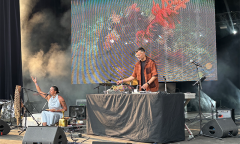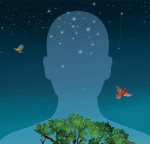The sun was setting on the ocean, but the voice of Whaia was rising. The singer from New Zealand, rooted in Maori and Pasifika ancestry, was lifting our spirits with incantations that soared into wordless melodies that crested and fell like ocean waves. The spell was sustained by Scottish sound artist Brian d’Souza, performing under the name Auntie Flo, conjuring the sea in electronic, undulating soundscapes.
I was among listeners in Nice, France, in the Theatre de Verdure, an outdoor amphitheater on the coast of the Mediterranean Sea. It was the first evening of the United Nations Ocean Conference, a five-day gathering of world dignitaries, conservationists, scientists, and academics, meeting and sharing plans to conserve our troubled oceans. For the five days, Theatre de Verdure was known as Nautilus Village. In collaboration with the United Nations and the city of Nice, Nautilus hosted music, films, and discussion panels under the Côte d’Azur sky.
The Indigenous singer and sound artist were not headliners at the conference. But their evocation of our innate connection to the ocean was a theme that ran through the heart of its speeches and conversations.
“The ocean is the lifeblood of our planet,” Antonio Guterres, United Nations Secretary-General, said in his opening remarks. “It produces half of the oxygen we breathe, nourishes billions of people, supports hundreds of millions of jobs, and underpins global trade. For many, the ocean is more than a source of food and livelihood. It shapes cultures, anchors identities, and feeds the soul.”
ADVERTISEMENT
Nautilus Members enjoy an ad-free experience.
Log in
or
Join now
.
I appreciated that Guterres then went goth on the gathered.
The ocean is under siege, he said. “Fish populations are collapsing due to reckless illegal fishing and overexploitation. Climate change is driving ocean acidification and heating—destroying coral reefs, accelerating sea level rise, and threatening communities worldwide. And plastic pollution is choking marine life and infesting our food chain—ultimately ending up in our blood and even our brains. When we poison the ocean, we poison ourselves.”
“Those who contribute negligibly suffer the most,” said the prime minister of Tuvalu, a tiny Pacific island.
What was the source of the poison? “Its name is greed,” Guterres said. “Greed that sows doubt, denies science, distorts truth, rewards corruption, and destroys life for profit.”
ADVERTISEMENT
Nautilus Members enjoy an ad-free experience.
Log in
or
Join now
.
There was another name for poison at the conference. Dignitaries were reluctant to mention it. But it was apparent to most everybody, and on occasion, speakers, shaking their heads and mumbling in resigned desperation, did let the name slip: the United States.
The U.S. had a negligible presence at the conference. Trump administration plans to fuel up oceangoing heavy equipment to mine seabeds for minerals, along with strafing public budgets for ocean and climate change research, were black smudges on the restorative blue vision of the conference.
Ninety-five countries signed a global treaty to reduce plastic pollution in the ocean. The U.S. produces the most plastic waste on the planet, 40 million tons annually, 20 percent of which spends its eternal days in the entrails of the ocean. The U.S. did not sign the plastics treaty.
Fifty countries and the European Union have ratified the “High Seas Treaty,” an ambitious plan to protect 30 percent of the ocean by 2030 (2.8 percent is protected now). The treaty would bind countries to enter an agreement to protect the ocean under plans that transcend national borders. With 60 signatories, the High Seas Treaty would be implemented by the United Nations. The U.S. did not ratify. So far, neither have China and India.
ADVERTISEMENT





